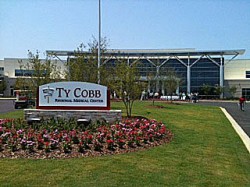Ty Cobb Regional Medical Center Partners for New Stroke Care Program
 Stroke is one of the leading causes of death in the U.S. and according to the Centers for Disease Control in Atlanta, cases of stroke in Northeast Georgia are higher than the national average.
Stroke is one of the leading causes of death in the U.S. and according to the Centers for Disease Control in Atlanta, cases of stroke in Northeast Georgia are higher than the national average.
As the demand for neurologists increases and new regulations impact hospitals, there is a growing shortage of experienced physicians available to provide continuous coverage.
That’s one reason Ty Cobb Regional Medical Center is now partnering with AcuteCare Telemedicine or ACT to provide a new service called “teleneurology” in their Emergency Department.
ACT provides around the clock stroke and other urgent neurological care by allowing hospitals to access highly respected expert neurologists via a television system similar to SKYPE.
According to hospital spokesperson Paige Burton, stroke patients and neurologists can interact via a camera and computer in the ER. CT scans and other imaging tests can also be sent via the Internet to a neurologist for evaluation.
With the new partnership, Ty Cobb Regional Medical Center is now the closest stroke-ready hospital in our area.
Dr. James Kiely is a neurologist with ACT.
At a recent educational breakfast at Ty Cobb Regional, Kiely educated EMS staff on the new services available and the latest treatment options for stroke.
The F.A.S.T. method is nationally used to help determine the cause of symptoms in a patient.
· F stands for facial droop. If you suspect someone is having a stroke, ask the person to smile. If one side of the face droops, that could be a sign of a stroke.
· A stands for arm drift. Ask the patient to hold out both arms for 10 seconds. If one arm starts to fall or feels weak or numb, that could be a sign of a stroke.
· S stands for speech. Ask the patient to repeat a simple sentence. If the person cannot speak or the speech is slurred, that could be a sign of a stroke.
· T stands for time. Stroke is an emergency. Call 911 immediately if you suspect someone is having a stroke.
According to Kiely, “Time is brain tissue. The faster a person can get to a stroke-ready hospital and receive treatment, the greater their chance of a full recovery.”
